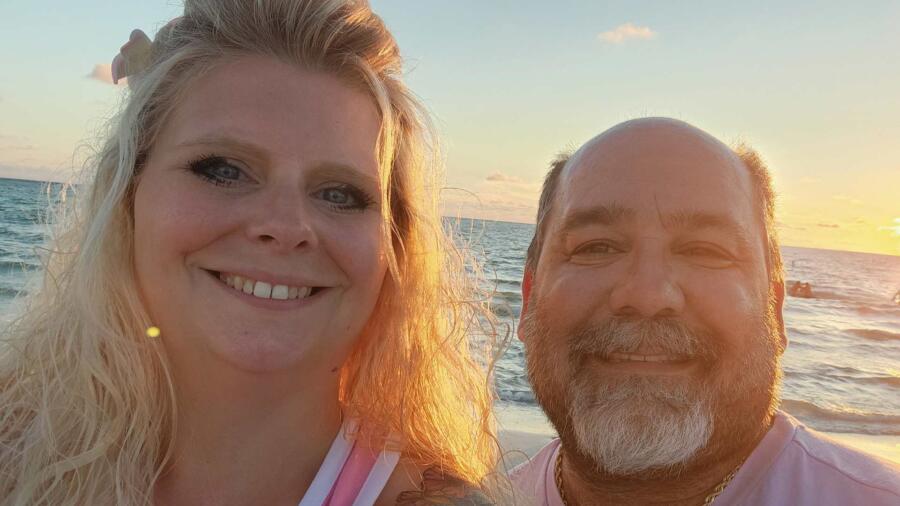In 1996, after being groomed and brainwashed by Tom Hose, a security guard at her middle school, 14-year-old Tanya Kach was held captive by him for years in his home in McKeesport, Pennsylvania.
After a decade of abuse, in 2006, Kach was able to escape at age 24 after confiding in a local store owner about the horrific ordeal she’d endured.
Kach speaks to A&E True Crime about her captivity, how she found the courage to leave and what her healing process has been like.
Hose abused his status as a trusted adult in order to groom you. What methods did he use?
He started off by giving me money so I could get cigarettes and go buy whatever. He would give me cigarettes, too, and he would give me jewelry. At first, he was very nice, giving me all that stuff. I also didn’t get into trouble much [when he noticed that I was] skipping class. It was favoritism. That lasted about four months.
Eventually, he lured you to his house and confined you to his bedroom for four years. How did he manage to keep you quiet and avoid detection from his parents?
He took me down[stairs] in the middle of the night to take a shower, because the shower was in the basement. Other than that, I didn’t really leave the room. For food, he brought me leftovers of whatever was on his plate.
How did you pass the time?
There was a TV in the room. There was also a boombox and I had headphones. I watched [Live With] Regis and Kelly. I watched them a lot. Now it’s [Live With] Kelly and Mark, and I still watch it every day. Regis and Kelly helped me a lot. They made me laugh, and that meant a lot to me.
Did you have thoughts of escaping?
At first, yes. But whenever I tried to, that’s when he’d threaten my life. He’d threaten to kill me in my sleep, throw me in a garbage bag and throw me in the river.
That must have been terrifying.
It was. I didn’t sleep a lot.
Were you aware of how much time was passing?
Yes. He had me keep a calendar book of our sex acts, so I knew the dates.
How did you keep your sanity through this?
I prayed a lot… I didn’t lose my faith. In fact, my faith grew strong through those 10 years.
Eventually, Hose started to let you out for brief periods of time. How did that feel?
It was scary, but it felt good to be out and to breathe in fresh air. That part felt really good. But it was scary because I was like a deer in the headlights out in the world. I hadn’t been out in four years.
What was your mental state at the time?
What was on my mind was doing what he told me to do when I was out, and then I had to get back to him. The first time he let me out, he gave me money to go buy clothes. He told me what bus to catch, what bus to catch home and where to walk exactly. He trusted me to go out because he knew I was brainwashed.
What led to him letting you out that first time?
His parents were going away and he wanted me to buy clothes that fit, because I was wearing hand-me-downs from him and his son. He wanted me to have more feminine clothes.
You managed to escape 10 years later, at age 24, when you took a part-time job at a local convenience store. How did you convince Hose to let you work?
[Hose] didn’t agree to the part-time job, I kind of did that behind his back. He thought I was hanging out there. I met the family that owned the place—the husband, Joe, the wife and the daughter. I saw how Joe was with his wife and his daughter. I saw how a family should be. I started trusting them because they seemed like such trustworthy people, and I confided in the husband. He knew something was wrong, so he pushed the questions and I ended up breaking.
How did your escape happen?
It took the rest of the day. I had to go back to the house and not do anything out of the ordinary. Joe called the police. The police arrived in the evening and got me out.
What did you feel as you took those first steps toward freedom?
It felt great, but I also felt guilty at the time, because I had turned on Tom. It was so fresh. Afterwards, the guilt wore off.
How did you work through that?
I went through some intense, intense therapy. I had Stockholm Syndrome, [a theory that explains why hostages can develop psychological bonds with their captors as a coping mechanism]. So they had to convince me that it wasn’t my fault.
What was it like to readjust to regular life? What was most challenging?
Everything was hard. I had to get medical insurance, I had to go on welfare. I didn’t know anything about that stuff. I went to GED classes and I got my GED, and then I went to college after that. Gaining back my freedom was tough, and getting back my education was tough, too. I had lost years of education.
What helped you the most in readjusting?
My advocate [from the Center for Victims in Pittsburgh] helped me, and my mom helped me a lot. My mom and I went through intense therapy together. My mom and I, we still have a pretty good relationship today. She helped me get my driver’s license; she helped me with college. She took me shopping to get clothes. My mom was a big supporter.
How are you doing now?
I am doing really good now. I am still in therapy after 18 years, which is perfectly fine. It’s O.K., because you have to take care of your mental state. It’s just like when you break your arm—you go to the hospital and get it fixed. My mind was broken, and it had to be fixed.
I have been married since 2018, but I have been with my husband since 2008. I also help take care of my grandchildren sometimes—they are my stepson’s kids—and that’s really great.
What advice would you give to young people to help them identify signs of grooming?
If somebody is too super nice and starts giving you gifts, and they start showing favoritism only to you, there is a problem. Also, when someone has constant criticism of your family and friends [that’s a warning sign]. That’s what [Hose] did to me. He’d say, ‘I could give you a better life. You don’t deserve what’s going on at home. You don’t deserve what’s going on with your friends.’
When you think about Hose these days, what do you feel?
Anger. Hurt.
When you tell your story, what do you want people to come away with?
That there is light at the end of the tunnel. You always have to hold that hope.
Related Features:
Why Some People Hold Others Captive
Women Who Were Abducted and Held Captive, But Later Escape
What’s Jaycee Dugard’s Life Like Today?


